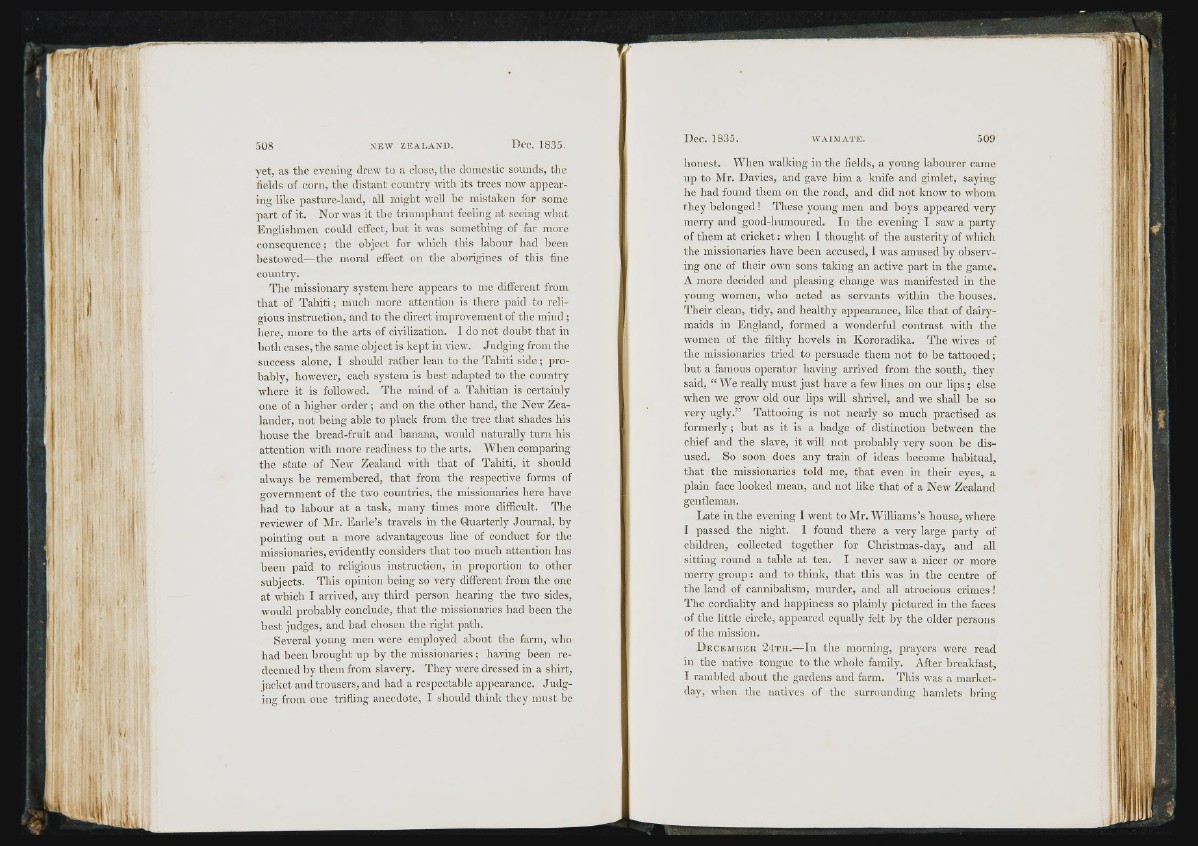
’ I
yet, as the evening drew to a close, the domestic sounds, the
fields of corn, the distant country with its trees now appearing
like pasture-land, all might well be mistaken for some
part of it. Nor was it tbe triumphant feeling at seeing what
Englishmen could effect, but it was something of far more
consequence; the object for which this labour had been
bestowed—the moral effect on the aborigines of this fine
country.
The missionary system here appears to me different from
that of Tahiti; much more attention is there paid to religious
instruction, and to the direct improvement of the mind ;
here, more to the arts of civilization. I do not doubt that in
both cases, the same object is kept in view. Judging from the
success alone, I should rather lean to the Tahiti side; probably,
however, each system is best adapted to the country
where it is followed. The mind of a Tahitian is certainly
one of a higher order; and on the other hand, the New Zealander,
not being able to pluck from the tree that shades his
house the bread-fruit and banana, would naturally turn his
attention with more readiness to the arts. JVhen comparing
the state of New Zealand with that of Tahiti, it should
always be remembered, that from the respective forms of
government of the two countries, the missionaries here have
had to labour at a task, many times more difficult. The
reviewer of Mr. Earle’s travels in the Quarterly Journal, by
pointing out a more advantageous line of conduct for the
missionaries, evidently considers that too much attention has
been paid to religious instruction, in proportion to other
subjects. This opinion being so very different from the one
at which I arrived, any third person hearing the two sides,
would probably conclude, that the missionaries had been the
best judges, and had chosen the right path.
Several young men were employed about the farm, who
had been brought up by the missionaries ; having been redeemed
by them from slavery. They were dressed in a shirt,
jacket and trousers, and had a respectable appearance. Judging
from one trifling anecdote, I should think they must be
honest. When walking in the fields, a young labourer came
up to Mr. Davies, and gave him a knife and gimlet, saying
he had found them on the road, and did not know to whom
they belonged ! These young men and boys appeared very
merry and good-humoured. In the evening I saw a party
of them at cricket: when I thought of the austerity of which
the missionaries have been accused, I was amused by observing
one of their own sons taking an active part in the game.
A more decided and pleasing change was manifested in the
young women, who acted as servants within the houses.
Their clean, tidy, and healthy appearance, like that of dairymaids
in England, formed a wonderful contrast with the
women of the filthy hovels in Kororadika. The wives of
the missionaries tried to persuade them not to be tattooed;
but a famous operator having arrived from the south, they
said, “ We really must just have a few lines on our lip s; else
when we grow old our lips will shrivel, and we shall he so
very ugly.” Tattooing is not nearly so much practised as
formerly; but as it is a badge of distinction between the
chief and the slave, it will not probably very soon be disused.
So soon does any train of ideas become habitual,
that the missionaries told me, that even in their eyes, a
plain face looked mean, and not like that of a New Zealand
gentleman.
Late in the evening I went to Mr. Williams’s house, where
I passed the night. I found there a very large party of
children, collected together for Cliristmas-day, and all
sitting round a table at tea. I never saw a nicer or more
merry group: and to think, that this was in the centre of
the land of cannibalism, murder, and all atrocious crimes !
The cordiality and happiness so plainly pictured in the faces
of the little circle, appeared equally felt by the older persons
of the mission.
D e c e m b e r 2 4 t i i .—In the morning, prayers were read
in the native tongue to the whole family. After breakfast,
I rambled about the gardens and farm. This was a market-
day, ivhen the natives of the surrounding hamlets bring